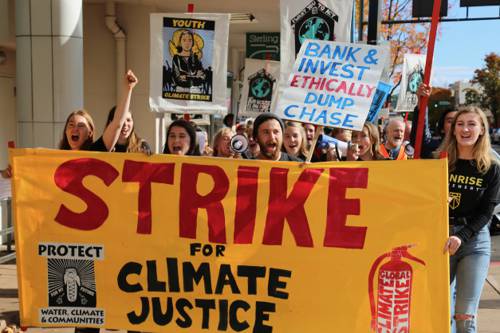
FAQ About The Role of Music in Global Youth Political Movements

How has music historically influenced youth political movements around the world?
Music has historically played a significant role in influencing youth political movements by acting as a medium for expressing dissent, solidarity, and hope. Songs and musical performances often convey powerful messages that resonate with the emotions and aspirations of young people, helping to galvanize support for causes and foster a sense of community.
For example, in the 1960s, anti-war songs became anthems for movements opposing the Vietnam War, while in South Africa, music was a tool for rallying support against apartheid. Bob Dylan's songs in the civil rights movement and punk music in the UK during the late 1970s are other instances where music amplified the voices of youth pushing for social and political changes.

What role does hip-hop play in global youth political movements?
Hip-hop serves as a potent vehicle for youth political expression across the globe, often addressing issues like social injustice, racism, poverty, and political oppression. Originating in the United States, hip-hop quickly spread worldwide and has been adapted to various cultural and political landscapes.
In France, artists like IAM and MC Solaar have explored themes of immigrant identity and social inequality, while in countries like Iran and Palestine, hip-hop has been a tool for expressing defiance against political and social restrictions. Hip-hop's global reach and grassroots origins make it a uniquely impactful genre in mobilizing youth for political movements.

Can you provide examples of specific political movements where music had a notable impact?
Yes, music has had a notable impact on numerous political movements. For example, during the Civil Rights Movement in the United States, songs like "We Shall Overcome" and "A Change Is Gonna Come" became anthems of hope and resistance.
In the anti-apartheid movement in South Africa, musicians like Hugh Masekela and Miriam Makeba used their music to raise awareness internationally. More recently, in the Arab Spring, bands such as El General in Tunisia used music as a rallying cry against oppressive regimes.

How does music contribute to the identity formation of youth involved in political movements?
Music contributes significantly to identity formation among youth involved in political movements by providing a shared cultural touchstone that resonates with their values and beliefs. Music often articulates the emotions and aspirations of young activists, helping them to connect more deeply with their causes.
Through songwriting, concerts, and cultural gatherings, young people find a sense of belonging and unity, reinforcing their collective identity. The lyrics, rhythms, and communal experiences of music allow youth to express individuality while simultaneously feeling part of a broader movement.

Why is music particularly effective in mobilizing young activists?
Music is particularly effective in mobilizing young activists because it is a universal language that transcends linguistic and cultural barriers, directly engaging the emotions and imagination. The emotional power of music helps to inspire, energize, and motivate young people to take action and join causes.
The accessibility of music, especially with modern digital platforms, means that songs of protest and change can rapidly disseminate to large audiences. Additionally, live performances can create powerful atmospheres that foster solidarity and community among attendees, reinforcing their commitment to activism.

What impact have digital platforms had on the relationship between music and youth political movements?
Digital platforms have significantly transformed the relationship between music and youth political movements by amplifying the reach and accessibility of political music. Platforms like YouTube, Spotify, and social media allow artists to distribute their music widely without relying on traditional media channels, enabling faster mobilization of support for political causes.
Online platforms also facilitate the sharing and discovery of protest music from different cultures, allowing for a more interconnected global youth movement. These digital tools have democratized music production and dissemination, empowering more voices and narratives in the sphere of political activism.

How do musicians balance their artistic integrity with political activism?
Musicians often face the challenge of balancing their artistic integrity with political activism by staying true to their creative vision while engaging with social issues. Maintaining authenticity is key; musicians who genuinely connect with the causes they promote are more likely to resonate with their audience.
Many artists use their platform to amplify marginalized voices and raise awareness about specific issues without compromising their artistic style. By seamlessly integrating their messages into their music rather than forced endorsements, musicians can maintain both their artistic and activist personas effectively.

What are some key genres of music associated with youth political movements?
Several key genres of music are associated with youth political movements, each bringing unique rhythms and messages that resonate with young activists. These genres include folk, punk, reggae, hip-hop, and rock. Each has various instances where they have been used to convey political messages and propel activism forward.
Folk music, exemplified by artists like Bob Dylan, played a significant role in the civil rights and anti-war movements. Punk music, with its rebellious and anti-establishment ethos, has energized youth protests in the UK and beyond. Reggae's messages of social justice and unity have made artists like Bob Marley iconic within political movements worldwide.

How does music support global youth movements beyond just the lyrics?
Beyond lyrics, music supports global youth movements through its ability to create networks of solidarity and spaces for activism. Music concerts and festivals can serve as venues for discourse, education, and mobilization, bringing together like-minded individuals and organizations.
The communal experience of music fosters an emotional and psychological bond among participants, reinforcing their commitment to political causes. Additionally, music videos, cover art, and social media presence extend the impact of music beyond just the auditory, contributing visually and culturally to youth political movements.

What challenges do musicians face when engaging in political activism?
Musicians face several challenges when engaging in political activism, including backlash from political entities, censorship, and the risk of alienating parts of their audience. Artists may encounter governmental restrictions that limit their ability to perform or distribute politically sensitive songs.
There is also the challenge of maintaining a cohesive message across diverse audiences, some of whom may not share the same political views. Navigating these challenges requires musicians to be strategic in their actions, often balancing direct activism with subtle messaging to maintain broad appeal without compromising their political stance.
